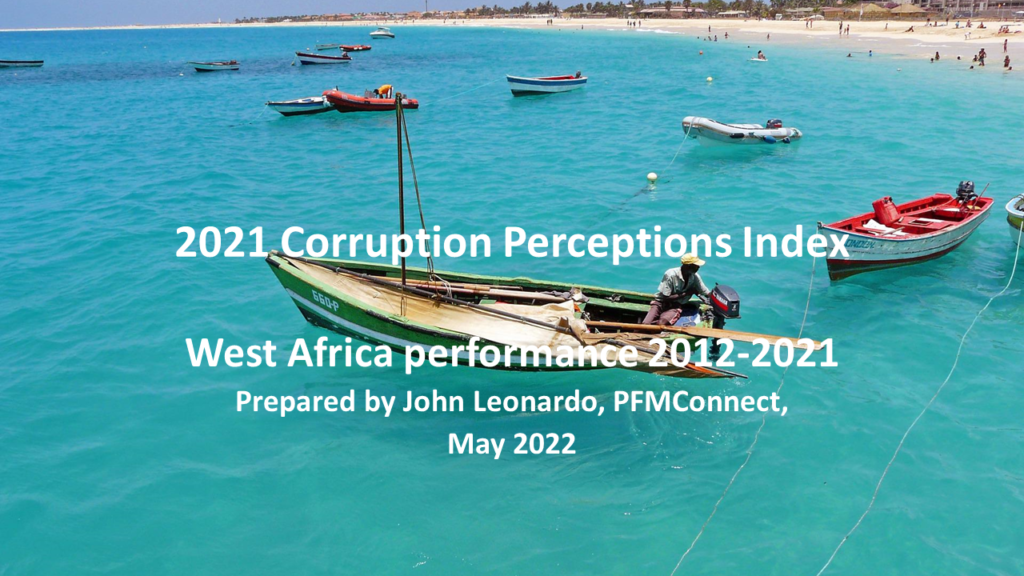Corruption in West Africa (a US perspective)

Introduction
The United States State Department’s Country Reports on Human Rights Practices (“country reports”) strive to provide a factual and objective record on the status of human rights worldwide. The 2021 country reports were published on 12 April 2022. Section 4 of the country reports provides an assessment of Corruption and Lack of Transparency in Government which addresses the extent to which a country’s law provides criminal penalties for corruption by officials and the level of implementation of these laws. The country reports provide an insight into a major influence on efforts to combat corruption in West Africa.
Scores for West African countries published by Transparency International in their 2021 Corruption Perceptions Index (CPI) report demonstrate that West Africa was ranked third equal out of the five African regions in terms of improvements in CPI scores during 2012-2021. Individual country CPI score performance was variable for West African countries in the 2012-2021 period. The country reports for West African countries reveal shortcomings in the majority of West African countries in the implementation of current criminal penalties for corruption by officials. Further discussion on corruption trends in West African countries is provided here.
Details of the Corruption and Lack of Transparency in Government overview comments for West African countries in the 2021 country reports are provided below.
“The law provides for criminal penalties for corruption by officials, and the government sometimes implemented the law effectively; however, there were numerous reports of government corruption during the year, and officials frequently engaged in corrupt practices with impunity. It was commonly believed, and acknowledged by some judicial personnel, that the judicial system at all levels was susceptible to corruption.”
“The law provides criminal penalties for corruption by officials, but the government did not implement the law effectively. There were numerous reports of government corruption during the year, including cases of misappropriation, fraud, or other offenses. The NGO National Network for Anti-Corruption cited the customs, police, and General Directorate of Land and Maritime Transport as the most corrupt entities in the government.“
“The law provides criminal penalties for corruption by officials, and the government generally implemented the law effectively. There were isolated reports of government corruption during the year.”
“The law provides criminal penalties for corruption by officials, but the government did not implement the law effectively, and officials reportedly engaged frequently in corrupt practices with impunity. Human rights organizations reported official corruption, particularly in the judiciary, police, and security forces, but they noted victims of such corruption often did not report it or assist in investigations because they believed the government would not act or they feared retaliation. Civil society groups and government officials reported the High Authority for Good Government (HABG), the government’s anticorruption authority, was not empowered to act independently or to take decisive action. The HABG can investigate alleged corruption but lacks the mandate to prosecute; it must refer cases to the public prosecutor. In July the government created a special unit within the Abidjan public prosecutor’s office dedicated to investigating complex economic and financial crimes, including those involving government officials.”
“The law provides criminal penalties for corruption by officials, but the government did not credibly investigate or prosecute any official accused of corruption. There were many allegations of government corruption.”
“The law provides criminal penalties for corruption by government officials, but the government did not implement the law effectively, and officials frequently engaged in corrupt practices with impunity. There were numerous reports of government corruption. Corruption was present in all branches of government, according to media and NGOs, including recruitment into the security services. Since the first special prosecutor took office in 2018, no corruption case undertaken by that office resulted in a conviction. When the new special prosecutor took office in August, his staff included one investigator and one prosecutor, both seconded from other offices. The government took steps to implement laws intended to foster more transparency Page 15 and accountability in public affairs. In July 2020 authorities commissioned the Right to Information (RTI) secretariat to provide support to RTI personnel in the public sector; however, some civil society organizations stated the government had not made sufficient progress implementing the law. The country continued use of the national anticorruption online reporting dashboard, for the coordination of all anticorruption efforts of various governmental bodies.”
“The law provides criminal penalties for corruption, but the government did not implement the law effectively. There were multiple allegations during the year of corrupt practices by public officials that went unpunished.”
“The law provides criminal penalties of one month to 10 years in prison for corruption by officials. The government did not implement the law effectively, and officials in all branches and on all levels of government engaged in corrupt and non-transparent practices with impunity. There were numerous reports of government corruption during the year.”
“The law provides criminal penalties for bribery, abuse of office, economic sabotage, and other corruption-related offenses committed by officials, but the government did not implement the law effectively. There were numerous reports of government corruption during the year. Officials frequently engaged in corrupt practices with impunity. Corruption was a fact of daily life for citizens and businesses alike. According to the September Center for Transparency and Accountability in Liberia State of Corruption Report, 90 percent of citizens thought corruption was high in the country and 76 percent had witnessed corruption. The report also labelled the national budget as a tool for corruption in which public resources end up in the pockets of public officials through direct payments, indirect payments, or backdoor deals. As noted earlier in Section 1.e., there was also reportedly widespread corruption in the judiciary, in the form of bribery and extortion where favourable decisions were bought or in the form of direct government influence over judicial decisions. The mandate of the Liberia Anti-Corruption Commission is to prevent, investigate, and prosecute cases of corruption among public officials. On June 14, President Weah appointed Edwin Kla Martin as the new executive chairperson of the commission, effective July 22. Martin’s appointment followed the resignation of Ndubuisi Nwabudike as chairperson in February amid allegations that Nwabudike obtained his Liberian citizenship illegally.”
“The law provides criminal penalties for corruption by officials, but the government did not implement the law effectively, and officials frequently engaged in corrupt practices with impunity. There were numerous reports of government corruption during the year.”
“Although the law provides criminal penalties for corruption by officials, the government did not implement the law effectively, and officials often engaged in corrupt practices with impunity. There were several reports of government corruption.”
“Although the law provides criminal penalties for conviction of official corruption, the government did not consistently implement the law, and government employees, including elected officials, frequently engaged in corrupt practices with impunity. Massive, widespread, and pervasive corruption affected all levels of government, including the judiciary and security services. The constitution provides immunity from civil and criminal prosecution for the president, vice president, governors, and deputy governors while in office. There were numerous allegations of government corruption during the year.”
“The law provides criminal penalties for corruption by officials, but the government often did not enforce the law effectively. Officials frequently engaged in corrupt practices with impunity. There were numerous reports of government corruption.”
“The law provides criminal penalties for corruption by officials, and the government generally implemented the law effectively. There were numerous reports of government corruption.”
“Although the law provides criminal penalties for corruption by officials, the government did not implement the law effectively. There were numerous allegations of government corruption, and some officials engaged in corrupt practices with impunity. The body responsible for combating corruption, the High Authority for Preventing and Combating Corruption and Related Offenses, is an independent body that works with the judiciary on strengthening anticorruption practices and oversees adherence of public officials to anticorruption statutes. It also has a public outreach function that includes raising public awareness and referring complaints for legal action. Other state entities, such as the Government Accounting Office and the Finances Inspectorate, investigated and audited public institutions but reported few results. Authorities maintained toll-free and text-messaging lines for citizens to report cases of corruption.”
Conclusion
The country reports for West African countries demonstrate that only a small proportion of these countries are well placed to fight against corruption by officials.
Limited overall progress is likely to be made against public sector corruption in West Africa while the relevant authorities fail to enforce criminal penalties for corruption.

